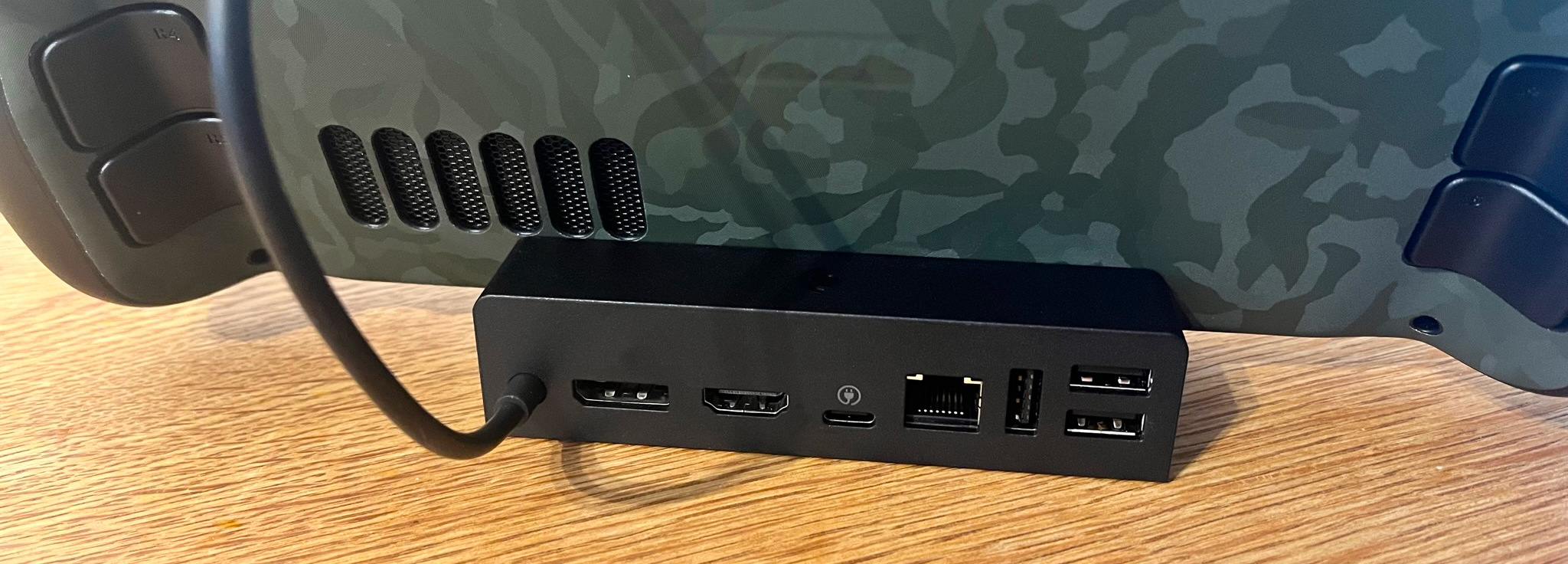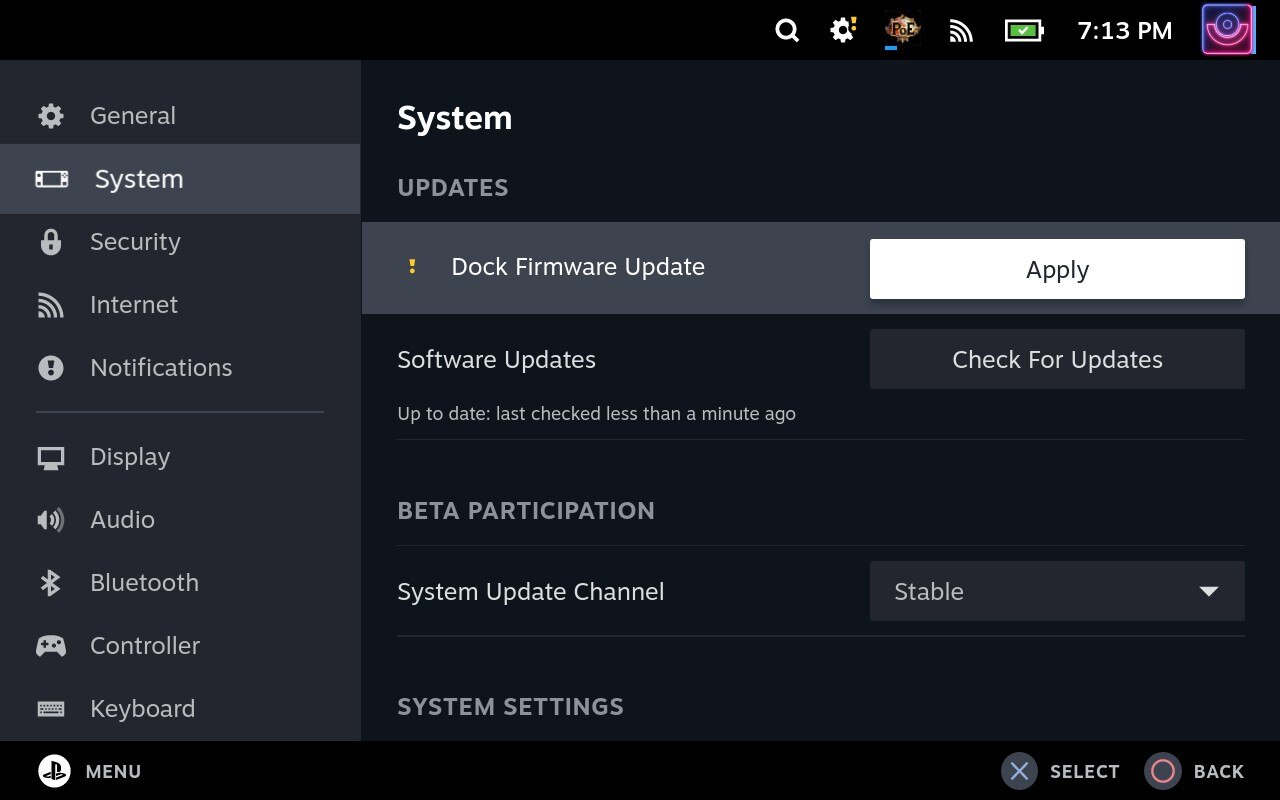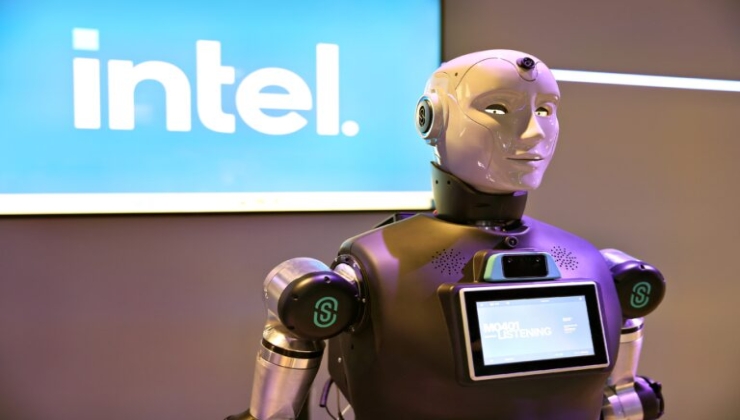After having and playing with the official Steam Deck Docking Station, here's some thoughts on the experience. Note: personal purchase.
Released earlier in October, along with the Steam Deck itself no longer having a reservation queue, I was very keen to see what Valve would give us officially. Especially since JSAUX and ivoler already provide great docked experiences for a lower price (since they don't give you a charger too).
For the basic design it's perfectly fine. All the ports are on the back out of the way, so you only see the short lip at the front when you've docked your Steam Deck. No ethernet wire poking out the side like with JSAUX (although ivoler don't have this issue). There's no problems with the design or build quality at all, except for those of you keeping thicker protective cases on where it won't fit in. It also has a nice non-slip cover on the bottom so it won't move around.
A reminder on what it has available: 3 x USB-A 3.1 Gen1 Ports, Gigabit Ethernet, DisplayPort 1.4, HDMI 2.0, USB-C Power Delivery pass-through input and an included charger.
When you first get it, you'll likely need a firmware update before you really use it. A big benefit of it, is that Valve provide firmware updates directly, so there's no messing with anything external. You either get a pop-up telling you one is available, or you can go into the settings and check for updates to have it appear. It probably won't be updated often but it's still a nice touch.
So it looks nice and it can get easy updates — how is the overall experience? Well, that's where things aren't so good in this case. I've now used 4 or 5 different JSAUX docks (I've lost count) and one from ivoler, I use my Steam Deck docked all the time and have done since before the original release (since I was an original Steam Deck reviewer) via two different USB-C Hubs, so I think I have a fair amount of experience here.
The problem is that the official Steam Deck Docking Station has its quirks with actually connecting to external displays, tested by connecting to multiple TVs and PC Monitors all from different vendors. Sometimes, it works right away. Most of the time though, I have to do a little dance between powering the Steam Deck down and on again, turning screens on and off and so on. Unfortunately, for me, the official Docking Station is very much not a plug and play experience. Sadly, I am apparently in a long list of people having issues with it. Looking on the Steam Forum, there's a great many posts of people seeing the same or just not seeing a signal on their external screen at all. A few in our Discord have also reported such issues too.
At 4K, the Steam Deck UI acts a bit weirdly too. Things don't always match up on the screen and the UI doesn't perform well. Thankfully, Valve added external screens settings so I can put it into 1080p and it works fine while still looking good overall. Not a big issue but one I hope they sort too.
Since Valve has put a lot of work into the docked experience, overall once it's actually setup correctly it works quite nicely. I have no big main complaints about the main docked experience right now. Bluetooth controllers both PS4 and Xbox work just fine, as do controllers plugged in via USB. Honestly, playing with the Steam Deck while docked is a really fun experience and really continues to show how versatile the Steam Deck is as a gaming device. However, I really do hope Valve add an easy way to deal with external drives as more people wish to use them to expand their storage even more. It's possible to do, like with the JSAUX M.2 SSD Dock, but the setup is annoying to do. They have the functionality there for SD Cards, so it's not a stretch to say they could expand that for other external drives too.
If Valve manage to sort out the issues with it connecting properly to external screens, which is the main function, it might turn around into a recommendation. For now though, I would suggest going with JSAUX or ivoler instead and if you already have a spare charger, you'll be saving money too.
You can buy it on Steam.
Quoting: JuliusReally a missed opportunity for Valve to not include a stand-alone Steam Link in the docking station. Price-wise it would have probably not made a big difference either.You can use the Steam Deck to stream from your desktop, but IMO there are two important features missing for a console-like couch gaming experience:
- HDMI CEC control
- activation of the Steam Deck via external controller
Both features are present in the Steam Link, so it shouldn't actually be too difficult for Valve to integrate them into the Steam Deck.
Quoting: Goggo66activation of the Steam Deck via external controllerI have seen sb turning on Deck via Steam controller.
Quoting: JuliusReally a missed opportunity for Valve to not include a stand-alone Steam Link in the docking station. Price-wise it would have probably not made a big difference either.Oh wow great idea!
Like the Wii U, but placing the smarts in the tablet :P
Last edited by MayeulC on 27 Oct 2022 at 2:31 pm UTC
Quoting: Mountain ManMultiple displays seem to be a problem for Linux in general. I've been wanting to add a second monitor to my setup for a while, but it would require a lot of hand editing of configuration files, and even that doesn't provide a guaranteed "it just works" solution.Huh?
I've been using two monitors now for as long as I can remember, on Linux. With AMDGPU it's pretty much plug and play, a desktop environment like Gnome, KDE, XFCE etc will for the most part do the heavy lifting for you.
With nvidia, as always it was a little more complex the last time I used it (around 2-3 years ago), but even then the binary blob used to (and probably still does?) provide a graphical interface for configuring monitor layouts and generated an xorg file for you.
Quoting: BlackBloodRumIt's plug and play with everything... with a small exception of if you have something like an nvidia/Optimus laptop. This is a hardware issue though, not software, as some laptops don't like to let you use the external displays unless you're forcing them into Discrete graphics mode. Other than that, Linux has handled multiple monitors for decades just fine. I run two 2560x1440 and a 3840x1200 monitor as my desktop setup, and it's amazing.Quoting: Mountain ManMultiple displays seem to be a problem for Linux in general. I've been wanting to add a second monitor to my setup for a while, but it would require a lot of hand editing of configuration files, and even that doesn't provide a guaranteed "it just works" solution.Huh?
I've been using two monitors now for as long as I can remember, on Linux. With AMDGPU it's pretty much plug and play, a desktop environment like Gnome, KDE, XFCE etc will for the most part do the heavy lifting for you.
With nvidia, as always it was a little more complex the last time I used it (around 2-3 years ago), but even then the binary blob used to (and probably still does?) provide a graphical interface for configuring monitor layouts and generated an xorg file for you.
Quoting: Mountain ManMultiple displays seem to be a problem for Linux in general. I've been wanting to add a second monitor to my setup for a while, but it would require a lot of hand editing of configuration files, and even that doesn't provide a guaranteed "it just works" solution.What setup are you using, out of curiosity? I've run dual monitors with Cinnamon (on an nVidia GPU) for years and it's always been pretty much plug'n'play.
Valve's next step should be a new Steam Controller.
Quoting: BlackBloodRumNot my experience with nvidia. Nvidia on xorg was very challenging because I have two monitors with mismatched refresh rates. The proprietary driver would force vsync on and set the max frame rate to the lowest refresh rate monitor. Some games respect disabling vsync in settings, some don’t.Quoting: Mountain ManMultiple displays seem to be a problem for Linux in general. I've been wanting to add a second monitor to my setup for a while, but it would require a lot of hand editing of configuration files, and even that doesn't provide a guaranteed "it just works" solution.Huh?
I've been using two monitors now for as long as I can remember, on Linux. With AMDGPU it's pretty much plug and play, a desktop environment like Gnome, KDE, XFCE etc will for the most part do the heavy lifting for you.
With nvidia, as always it was a little more complex the last time I used it (around 2-3 years ago), but even then the binary blob used to (and probably still does?) provide a graphical interface for configuring monitor layouts and generated an xorg file for you.
I also was unable to set a monitor refresh rate to anything above 120hz. Setting refresh to 144hz (1440p) caused my display to have strange artifacts.
Switching to Wayland fixed the first problem, switching to AMD fixed the second problem.
Other than that, though, my experience has been very smooth. A mouse and a keyboard work flawlessly, and my Steam Controller is detected almost instantly.
I exchanged the included 45W one (same as the one the Steam Deck ships) with a 90W charger. Since then the issues with displays and other peripheral reduced a lot. Not 100% perfect but before it was almost unusable.
Quoting: michaI have the official Steam Deck Docking Station station as well and I believe most issues come from the low power supply unit.Only makes sense if you'd power your monitor over the Dock/charger, I guess?
I exchanged the included 45W one (same as the one the Steam Deck ships) with a 90W charger. Since then the issues with displays and other peripheral reduced a lot. Not 100% perfect but before it was almost unusable.
The automatic setting defaults to 1920x1080 in game mode but I can easily set it to use the monitors full ultrawide 3440x1440 and it looks amazing. But I set it back and prefer using it at 1080p.
Once I get a small Bluetooth keyboard I'll start using desktop mode more. Right now I mainly use it to install and set up games. I also plan to occasionally hook it up to a TV for docked play.
Anyway I'm really enjoying it.
Last edited by GeeksOnHugs on 28 Oct 2022 at 2:21 pm UTC
Quoting: EikeNope, monitor has it's own power.Quoting: michaI have the official Steam Deck Docking Station station as well and I believe most issues come from the low power supply unit.Only makes sense if you'd power your monitor over the Dock/charger, I guess?
I exchanged the included 45W one (same as the one the Steam Deck ships) with a 90W charger. Since then the issues with displays and other peripheral reduced a lot. Not 100% perfect but before it was almost unusable.
I noticed that the problems were far less when I used keyboard + mouse in bluetooth mode instead of USB. And I doubt that those two drain a lot. At least I would expect the standard power adapter to be able to handle such.
Maybe, its specific to the EU (and UK? )adapters and that's how it slipped quality assurance. Just a guess though.
Quoting: michaNope, monitor has it's own power.Have you got an idea how this could be connected? The power given should be way more than enough for usual input peripherals, the Deck and some battery loading even if it's a "Monday product", right?
I noticed that the problems were far less when I used keyboard + mouse in bluetooth mode instead of USB. And I doubt that those two drain a lot. At least I would expect the standard power adapter to be able to handle such.
Maybe, its specific to the EU (and UK? )adapters and that's how it slipped quality assurance. Just a guess though.
Last edited by Eike on 28 Oct 2022 at 4:17 pm UTC
Quoting: mr-victoryI connected my Steam controller and, indeed, the Steam Deck does turn on by pressing a controller button.Quoting: Goggo66activation of the Steam Deck via external controllerI have seen sb turning on Deck via Steam controller.
It does not work with a generic wired controller, though.
















 How to setup OpenMW for modern Morrowind on Linux / SteamOS and Steam Deck
How to setup OpenMW for modern Morrowind on Linux / SteamOS and Steam Deck How to install Hollow Knight: Silksong mods on Linux, SteamOS and Steam Deck
How to install Hollow Knight: Silksong mods on Linux, SteamOS and Steam Deck